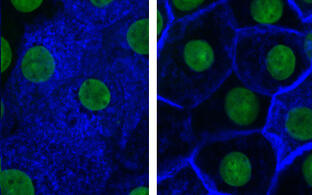Screening Unit
Jens Peter von Kries
Profil
The Unit serves for systematic screening of large compound or genome-wide RNAi libraries with state-of-the-art equipment like automated microscopes and microfluidic systems (see also "Technologies") within EU, BMBF, DFG and regionally funded academic networks.
Four 384tip pipetting systems enable one to test up to 160.000 compounds per day for their biological effects. (foto: Lothar-Michael PETER, www.foto-LMP.de, info@foto-LMP.de)
The mission of the platform is to enable access for academic projects towards experiments in high-throughput without loss of IP and on a cost basis, which does not restrict access towards HTS usage.
The Screening Unit is part of the Chemical Biology Platform of the FMP also supported by the MDC. This platform extends collaborative support through the Screening Unit (Jens Peter von Kries) by Medicinal Chemistry (Marc Nazaré) and by Drug Design (Ronald Kuehne).
Within this platform the mission of the Screening Unit is to
- optimize biological tests for robustness in HTS
- develop automated data analysis pipelines
- miniaturize biological tests towards 384well format
- identify and validate novel screening technologies for support
Highlight projects
- Identification of the gene encoding for the volume regulated anion channel (VRAC) which also mediates drug resistance (PI: Thomas Jentsch).
- Inhibitors of mechanoreception and chronic pain (PI: Gary Lewin).
- Identification of compounds which block the self-renewal of cancer stem cells (PI: Walter Birchmeier).
Service and Technology
More then 250 screening projects (Highlights) have been already supported in EU (MolDiaPaca, SFMET, AntiFlu), BMBF (Mtub, GoBio, NGFN...), DFG (FG-806) and TSB/IBB (Profit) funded work. Three projects are already either at the beginning or within clinical trials for patients suffering from cancer or rare disease like head stroke due to malformation of blood vessels.
The Unit served for academic and SME partners:
- dnaAcos, Oslo (Norway)
- Redoxis, Gothenburg (Sweden)
- Jerini AG, Berlin (Germany).
For development of hardware:
- Tecan Austria & Switzerland
- Cellomics Inc. (Thermofisher)
Data documentation and analysis have been automated according to defined standard operating procedures and analysis pipelines. About 70.000 compounds can be screened (per pipetting workstation, total of 4) and analyzed in a single day (12 hrs) depending on the test system/detection method used. A complex set of reports containing heat maps, different statistical analysis routines, similarity clustering and inter screen analysis for identification of frequent hitters is provided.
Furthermore the Screening Unit tests novel detection systems, develops analysis and object identification routines, and in the case of positive outcomes integrates these into the daily screening service. For instance the usage of machine learning routines in collaboration with the ETH-Zürich for automated object identification in screening with automated microscopes. The latest technologies integrated are
- label-free impedance measurement (Excelligence, 96well/384well)
- surface plasmon resonance (Biacore T200)
- high speed kinetic imaging (FLIPR-Tetra)
see (see Technologies) for more details.
Beside this service, the Screening Unit also manages the technology platform for genome-wide RNA-interference of the Max-Delbrueck-Centrum for Molecular Medicine (MDC) and the Berlin Institute for Medical Systems Biology to be used for Systems Biology in C. elegans, mouse and in human cell lines.
Important notice
As genome-wide RNA-interference may require large amounts of expensive liposome reagents to screen up to 800 MTP´s in 384well format, it is a very expensive approach, especially in combination with dual-luciferase reporters. Therefore you may wish to contact us to discuss alternative reporter systems and to estimate the required funding budgets.








